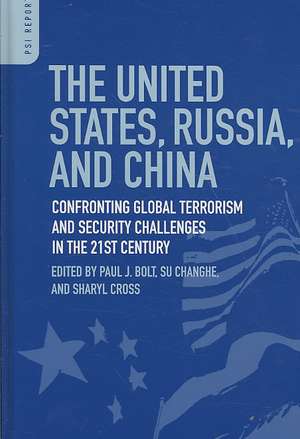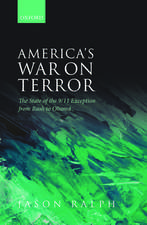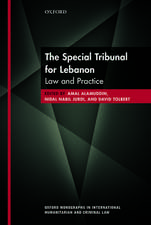The United States, Russia, and China: Confronting Global Terrorism and Security Challenges in the 21st Century: PSI Reports
Editat de Paul J. Bolt, Su Changhe, Sharyl Crossen Limba Engleză Hardback – 29 apr 2008 – vârsta până la 17 ani
Din seria PSI Reports
- 35%
 Preț: 414.13 lei
Preț: 414.13 lei - 28%
 Preț: 361.86 lei
Preț: 361.86 lei - 27%
 Preț: 376.91 lei
Preț: 376.91 lei - 28%
 Preț: 437.31 lei
Preț: 437.31 lei - 24%
 Preț: 412.88 lei
Preț: 412.88 lei - 28%
 Preț: 412.61 lei
Preț: 412.61 lei - 27%
 Preț: 376.58 lei
Preț: 376.58 lei - 27%
 Preț: 376.43 lei
Preț: 376.43 lei - 28%
 Preț: 438.17 lei
Preț: 438.17 lei - 27%
 Preț: 378.09 lei
Preț: 378.09 lei - 28%
 Preț: 437.75 lei
Preț: 437.75 lei - 24%
 Preț: 459.91 lei
Preț: 459.91 lei - 28%
 Preț: 459.91 lei
Preț: 459.91 lei - 28%
 Preț: 412.79 lei
Preț: 412.79 lei - 24%
 Preț: 459.51 lei
Preț: 459.51 lei - 28%
 Preț: 435.55 lei
Preț: 435.55 lei - 28%
 Preț: 375.66 lei
Preț: 375.66 lei - 24%
 Preț: 462.45 lei
Preț: 462.45 lei - 27%
 Preț: 360.03 lei
Preț: 360.03 lei - 14%
 Preț: 333.24 lei
Preț: 333.24 lei - 28%
 Preț: 437.40 lei
Preț: 437.40 lei - 27%
 Preț: 370.30 lei
Preț: 370.30 lei - 24%
 Preț: 462.45 lei
Preț: 462.45 lei - 24%
 Preț: 463.72 lei
Preț: 463.72 lei - 27%
 Preț: 379.88 lei
Preț: 379.88 lei - 18%
 Preț: 322.02 lei
Preț: 322.02 lei - 18%
 Preț: 335.62 lei
Preț: 335.62 lei - 14%
 Preț: 337.61 lei
Preț: 337.61 lei - 27%
 Preț: 339.36 lei
Preț: 339.36 lei - 26%
 Preț: 348.26 lei
Preț: 348.26 lei
Preț: 412.88 lei
Preț vechi: 569.89 lei
-28% Nou
Puncte Express: 619
Preț estimativ în valută:
79.01€ • 82.70$ • 65.76£
79.01€ • 82.70$ • 65.76£
Carte disponibilă
Livrare economică 10-24 martie
Preluare comenzi: 021 569.72.76
Specificații
ISBN-13: 9780275998943
ISBN-10: 0275998940
Pagini: 228
Dimensiuni: 156 x 235 x 22 mm
Greutate: 0.48 kg
Editura: Bloomsbury Publishing
Colecția Praeger
Seria PSI Reports
Locul publicării:New York, United States
ISBN-10: 0275998940
Pagini: 228
Dimensiuni: 156 x 235 x 22 mm
Greutate: 0.48 kg
Editura: Bloomsbury Publishing
Colecția Praeger
Seria PSI Reports
Locul publicării:New York, United States
Notă biografică
Paul J. Bolt is Professor and Head of the Department of Political Science at the United States Air Force Academy. He is also the author of China and Southeast Asia's Ethnic Chinese: State and Diaspora in Contemporary Asia (Praeger, 2000).Su Changhe is Professor of International Affairs and Executive Dean at the School of International and Diplomatic Affairs (SIDA), Shanghai International Studies University.Sharyl Cross is Professor of National Security Studies, George C. Marshall European Center for Security Studies in Garmisch-Partenkirchen, Germany. She also co-edited The New Chapter in United States-Russian Relations: Opportunities and Challenges (Praeger, 1994).
Cuprins
PrefaceIntroduction1. Chinese, American, and Russian Security Policies: The Response to TerrorismTransnational Security Issues and Challenges2. Nuclear Weapons in a Changing Threat Environment3. Toward Building Cooperation in Energy Security4. Chinas Growing Ecological Footprint: Global Threat or Opportunity for Collaboration?5. Perspectives from the U.S., Russia, and China on Countering Ideological Support for Terrorism6. Responses to Border/Internal Security Threats: "The Terror of Disease and the Disease of Terror"Regional Security Issues and Challenges7. Europe-Russia-U.S.: Whither Are We Drifting?8. Central Asian States and Policy Triangles: China, Russia and the United States9. Contemporary Security Challenges in the Middle East10. Managing Nuclear Proliferation: Chinese and American Approaches to North KoreaEditors and Contributors











